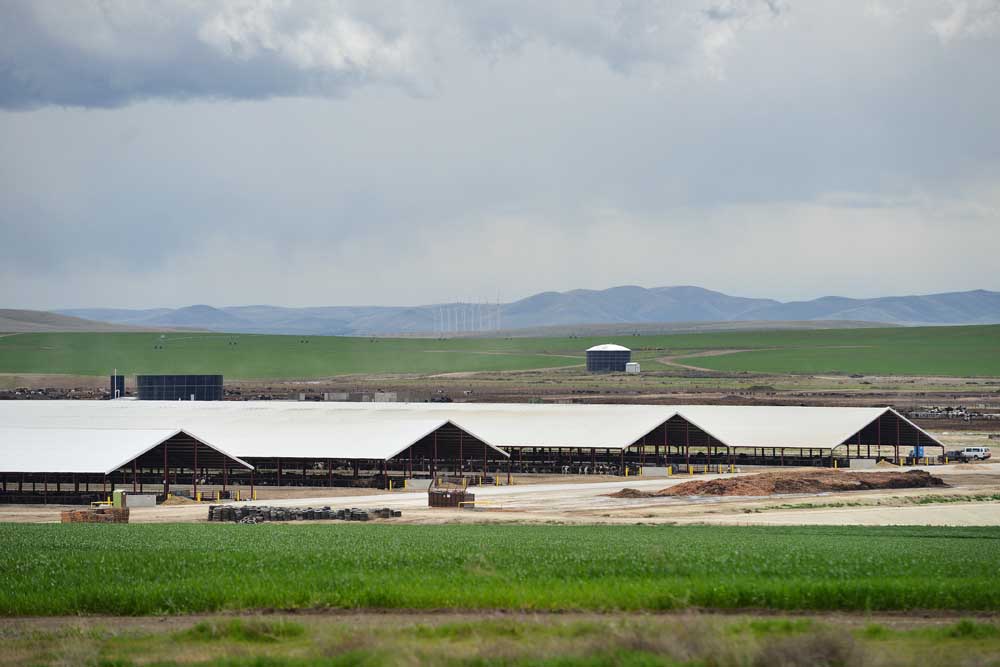Judge denies manure easement needed to operate Easterday Dairy
Published 3:15 pm Tuesday, November 29, 2022

- The former Lost Valley Farm outside Boardman, Ore., which Cole Easterday proposes to reopen.
A federal judge has refused to reinstate a manure easement needed to operate a large Eastern Oregon dairy owned by the Easterday farm family.
The ruling is a setback for the planned reopening of the controversial dairy, previously known as Lost Valley Farm, which the Easterdays bought in 2019 after the facility was shut down for water quality violations.
U.S. District Judge Andrew Hallman has denied an injunction allowing their Easterday Dairy near Boardman, Ore., to apply manure and wastewater to adjacent farm fields owned by Fall Line Capital.
While the “Easterdays will likely lose their dairy business without court intervention,” they haven’t shown they’re likely to prevail in their contract dispute with Fall Line Capital, which revoked the manure easement last year, Hallman said.
The judge said the lawsuit is ultimately about the “significant disruption in the business relationship between the Easterdays and Fall Line” caused by the criminal conduct of family patriarch Cody Easterday. Last month, he was sentenced to 11 years in prison for a massive cattle fraud scheme.
“The court is sympathetic to the hardship the Easterdays face, which includes the potential loss of their dairy business,” Hallman said. “However, those hardships were self-inflicted by Cody Easterday’s 230-million-dollar fraud and the agreements they willingly entered after.”
The dairy was originally developed by Greg te Velde, who owned other large operations in California. Manure and wastewater from the facility’s 30,000 head of cattle was intended to fertilize the surrounding farmland.
In 2018, the facility ran into trouble with state farm regulators, who fined it nearly $200,000 for unauthorized waste discharges, and a major creditor, who sought to foreclose on the property to recoup $67 million worth in loan defaults.
The case attracted widespread attention due to te Velde’s problems with gambling, drugs and prostitution, with environmental critics citing the debacle when calling for a moratorium on similar “mega-dairies” in Oregon.
Fall Line Capital bought the entire Lost Valley Farm during the ensuing bankruptcy proceedings, later selling the 736-acre dairy to the Easterdays while keeping the 6,500-acre adjacent farm parcel. The Easterdays obtained an easement and lease allowing them to dispose manure and wastewater on the property.
Last year, Cody Easterday declared bankruptcy on some of the family’s business operations and ended up pleading guilty to fraudulently charging a major beef packer for 200,000 non-existent cattle. Due to a “series of defaults” involving the Easterday Dairy agreements, the family renegotiated the lease and easement with Fall Line Capital, according to court documents.
However, Fall Line Capital later decided to lease the adjacent farmland to another company and revoked the easement, preventing the dairy facility from housing cattle and prompting the family to file a federal lawsuit.
Easterday Dairy — now run by Cody Easterday’s son, Cole — sought an injunction to regain access to the farmland, which is needed to obtain a “confined animal feeding operation” permit. Without a plan for managing waste, state regulators are unlikely to approve such a CAFO permit.
The judge has now rejected that request because the Easterdays haven’t proven the easement was revoked unlawfully.
The family didn’t obtain insurance for the dairy or disclose financial information as required, defaulting on their updated agreements with Fall Line Capital, he said.
“Moreover, this default was material given the significant concerns regarding the financial health of Easterday Dairy following Cody’s fraud and the Easterdays’ related bankruptcies,” Hallman said.
Without evidence that Fall Line Capital acted in bad faith, reinstating the easement in the long term isn’t justified, he said.
Leasing the farmland to another company appears to be a “simple business decision,” rather than a deliberate attempt to hinder Easterday Dairy, he said.
“Ultimately, Fall Line became concerned about the Easterdays’ solvency and opted for a safer and more lucrative business opportunity in leasing the farm parcel to a third party,” the judge said.
While it’s “unlikely that the Easterdays will ever obtain a live CAFO permit and be able to maintain a functioning dairy,” which represents irreparable harm, “their proposed remedies far exceed any relief this court could grant,” Hallman said.
To ensure the dairy complies with CAFO conditions, the injunction would effectively require Fall Line Capital to turn over detailed agricultural records and allow the Easterdays to manage fertilizer and irrigation decisions on the adjacent farmland, he said.
Even if the easement was reinstated in the long-term, its terms wouldn’t “grant the Easterdays access to all the information, records, and control of farming operations they need for permit compliance,” the judge said.







